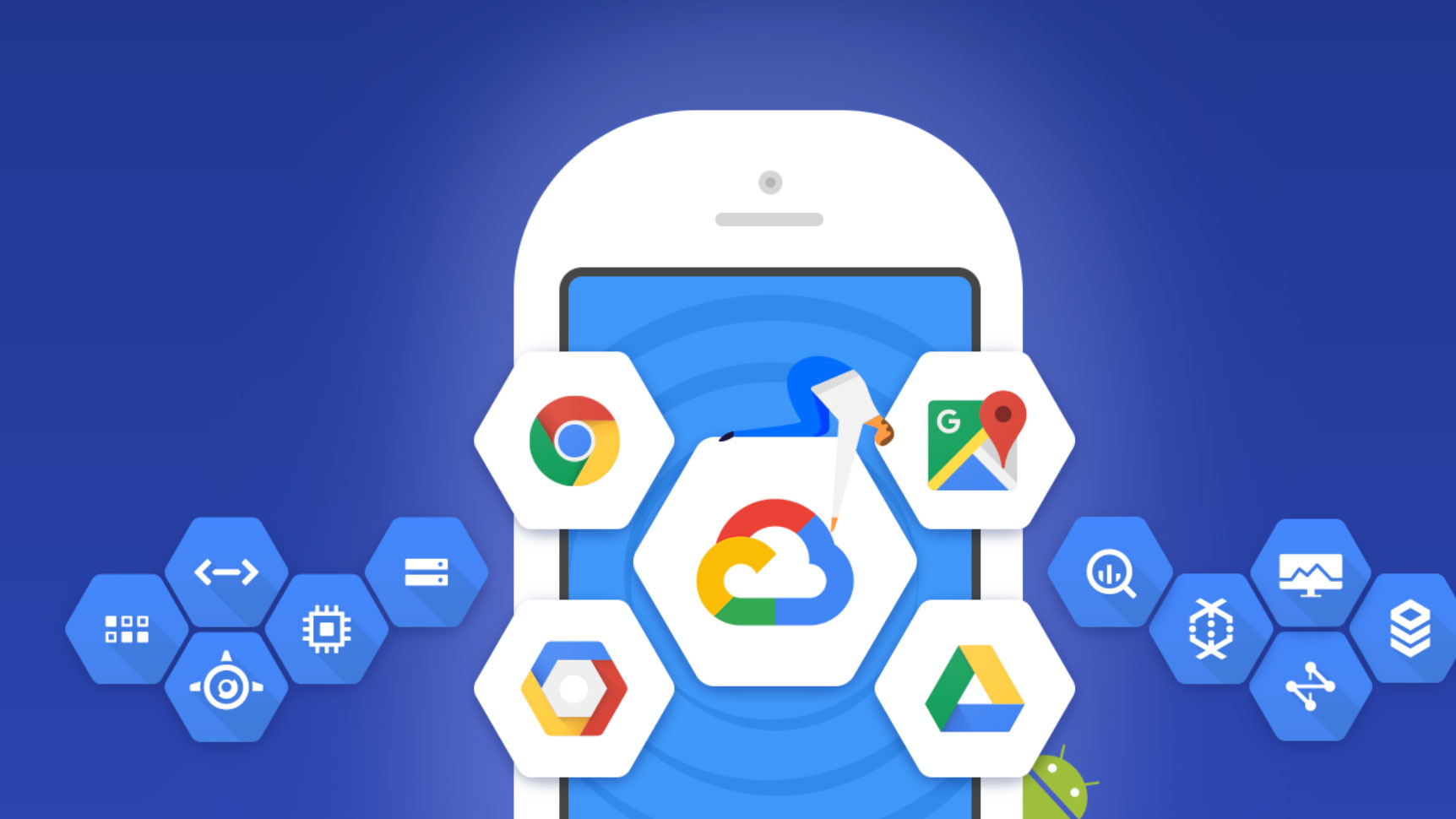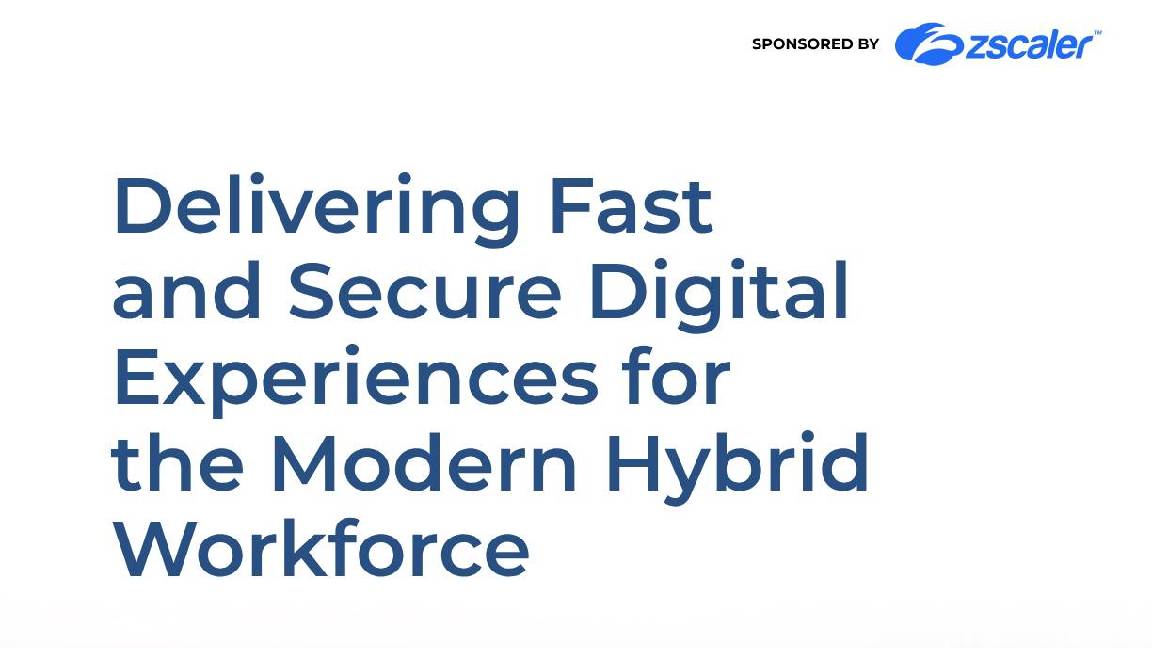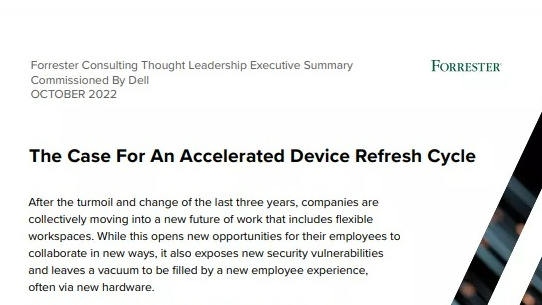What does digital transformation mean to your business?
There has been a lot of talk about digital transformation, but what is it really and what are the benefits for your business?

Talk to any business executive, IT vendor or analyst, and chances are you'll hear the same two words crop up again and again, in every industry and every economic bracket: digital transformation.
But what is digital transformation? It's used as a buzzword by many, but why is it such a hot topic? With so many different people talking about it, it's easy to lose sight of what digital transformation' really means, but it's actually quite simple - it's about using the best technology available to unlock the potential and productivity of your workforce.
Digital transformation simply means that a company should approach everything it does with a digital-first mindset. Companies who want to digitally transform should be ready to embrace new tools and methods of working, and be prepared to take risks. It doesn't just mean investing in some fancy new IT and calling it a day; rather, it's about businesses making a change to how they think and operate.
Digital transformation is best enabled through use of technology like cloud-based apps and mobile-first devices, but it's as much a cultural and organisational shift as it is a technological one. Management needs to fully embrace the agility and flexibility that is required for digital transformation projects to reach fruition.
Flexibility is a particular watchword when it comes to working practises. Falling component prices combined with rising compute power has meant that high-quality ultraportable laptops, 2-in-1 and mobile devices are well within the reach of even small businesses. Employees can now benefit from the portability of ultra-thin, lightweight devices, which means they can be as productive on the move, as they would be in the office.
The rise of more flexible working models has, to a large extent, been driven by the cloud, which could be described as the cornerstone of digital transformation. The rapid growth of mobile internet connectivity and apps has allowed business services like CRM, ERP and other back-office functions to be provided via mobile and web-based apps rather than the costly on-premise software of previous years. These solutions are cheap, highly versatile, and can be accessed from any device with an internet connection.
For example, the best place to start your digital transformation journey is with something relatively simple: documents. Documents are an integral part of any organisation, but many businesses are still approaching them in the same way they did twenty years ago. One person will create a document, attach it to an email, send that email to a colleague or partner, that person will make some changes, attach it to another email and send it back. Not only is this labour-intensive and time-consuming, it means that you often end up with two (or more) near-identical copies of the same documents cluttering up hard drives and risking potential data leakage.
With modern cloud-based document apps, however, all of the stakeholders in a given project can edit the same document simultaneously, from any device - whether they're in the office or on the other side of the world. You can easily share files with just a link, and you can also control who has access - so even if a sensitive document gets sent to the wrong person by accident, you can make sure that only authorised people can view it.
This pairs perfectly with cloud storage. Rather than having files shackled to an individual machine or file-share, all your company's documents are securely stored in one central location, with the ability to set strict controls on which employees and partners can access which files and folders. Sharing is also improved, speeding up the process of collaboration and the ability to access everything they need from any location means employees can be more productive when they're out of the office.
Real-time collaboration tools are another key enabler of this. While email is a useful tool, it can often be slow, inefficient and hard to monitor. With tools like Slack and other real-time collaboration platforms, staff can rapidly bounce ideas back and forth, work on group projects and keep track of progress in multiple different areas. The fact that many collaboration tools also work with other enterprise software tools is another bonus, allowing you to pull in information and complete tasks using the rest of your IT stack.
Interoperability and ease of management is a benefit that shouldn't be understated - making sure that everything links together in a smart and seamless way can add real value to your business and help your employees be safer and more productive. Most SaaS solutions offer centralised management tools, so IT can control who has access to what, as well as making sure that you're getting as much use as possible out of your apps by maximising efficiency.
Another important - and often overlooked - element of digital transformation is that businesses must wholeheartedly embrace the power of data. A key component of any transformation project, should be using automated tools to gather data on every possible area of the business - whether it be sales, customer satisfaction or website traffic - and then feeding it through analytics tools to gain actionable insights. By using data-driven insights to inform business decisions, you can reduce risk and better predict outcomes, allowing you to be more confident in your decision-making.
The most critical thing to bear in mind, however, is that all of these pieces need to be part of a wider end-to-end strategy. It's all very well having all of the latest, shiniest cloud tools, but unless you've identified the right tools to solve your specific business challenges and deployed them effectively so that every app works with and complements everything else, you won't see the full benefits that digital transformation can bring.
Let's say, for example, that a sales representative is on their way to pitch to a potential client. They can post a Salesforce link to their colleagues at the office via Slack, which will automatically pull in the client's key details details. They can then use Slack to share the deck for the pitch with them as a Google Slides presentation, which the rest of the team can edit and adjust, with their changes being instantly saved and synced in real time.
Once the pitch is won, the salesperson can mark the deal as closed in Salesforce, which will then in turn trigger an automatic post to Slack letting the rest of the team know that the account has been won. The rest of the team can then draw up any documents or contracts they need to and send it to the client as a Google Doc file. The client can sign it instantly, and the signed contract is saved to the company's cloud storage archive, ready to be filed with the accounts department - all within minutes of the pitch meeting's conclusion.
This is a perfect example of how well-executed digital transformation projects can radically speed up your business' efficiency, but it can be difficult to get your whole IT stack working seamlessly in concert, with the right tool for every job. This can sometime be accomplished by a particularly visionary CIO, but even with the most forward thinking and switched-on leadership teams, it can help to get an outside perspective.
This is where a good technology partner can come in really handy. Bringing in a third-party IT solutions partner can make digital transformation projects dramatically easier. Not only do they have the skills and training to ensure that all of your tools and processes are deployed and configured to maximum effect, they may be able to identify problems or inefficiencies that you hadn't noticed, or areas of synergy that you haven't yet capitalised on.
A good partner will also have experts in the area of cloud-based apps and modern technology, with a deep knowledge of the available offerings and their merits. And as you'd expect from a good partner, they can proactively support you as the technology landscape changes, ensuring your software stack is always working for your company's benefit rather than the reverse. Partners can help you source and install the technology and tools to power your digital transformation, but they can also help you design and plan your journey, making sure you have the most effective strategy in place from the very beginning.
That's what makes Ancoris - winner of Best Enterprise Digital Transformation Project at the UK Cloud Awards - such a valuable partner for companies looking to reinvent themselves for the digital age. Not only does Ancoris have a deep and detailed knowledge of the best way to put cloud-based software like Google's G-Suite to work within your organisation, it can also identify which tools to augment it with in order to solve your particular challenges and propel your business to new heights.
Make no mistake, digital transformation is far more than just a buzzword, it's a vision of what your business could be with the right tools, solutions and processes in place. And while embarking on that journey can seem like a daunting prospect, the right partner can can ensure smooth sailing along the way.
Find out how Ancoris can help your business in its digital transformation.
Sign up today and you will receive a free copy of our Future Focus 2025 report - the leading guidance on AI, cybersecurity and other IT challenges as per 700+ senior executives
ITPro is a global business technology website providing the latest news, analysis, and business insight for IT decision-makers. Whether it's cyber security, cloud computing, IT infrastructure, or business strategy, we aim to equip leaders with the data they need to make informed IT investments.
For regular updates delivered to your inbox and social feeds, be sure to sign up to our daily newsletter and follow on us LinkedIn and Twitter.
-
 The modern workplace: Standardizing collaboration for the enterprise IT leader
The modern workplace: Standardizing collaboration for the enterprise IT leaderHow Barco ClickShare Hub is redefining the meeting room
-
 Interim CISA chief uploaded sensitive documents to a public version of ChatGPT
Interim CISA chief uploaded sensitive documents to a public version of ChatGPTNews The incident at CISA raises yet more concerns about the rise of ‘shadow AI’ and data protection risks
-
 'Digital hide-and-seek': Workers are wasting hundreds of hours a year sourcing the information they need to carry out their role
'Digital hide-and-seek': Workers are wasting hundreds of hours a year sourcing the information they need to carry out their roleNews Knowledge workers globally are wasting a quarter of their working week tracking down information, new research from Atlassian has revealed.
-
 Untethered: How CIOs and CISOs are paving the way for the new hybrid workforce
Untethered: How CIOs and CISOs are paving the way for the new hybrid workforceWhitepaper Effective techniques to transition from exposed legacy infrastructure to an effective zero trust strategy
-
 Unlocking the power of your digital services
Unlocking the power of your digital servicesSponsored Businesses have invested significant cash into technology since COVID-19, but are they really getting their money's worth?
-
 Delivering fast and secure digital experiences for the modern hybrid workforce
Delivering fast and secure digital experiences for the modern hybrid workforceWhitepaper A new approach to digital experience monitoring that can monitor the health of all systems
-
 Collaboration is the glue that holds your business together
Collaboration is the glue that holds your business togetherSPONSORED A combination of productivity tools and cloud telephony can enable the best from your workforce
-
 The future of work and the forgotten workforce
The future of work and the forgotten workforcewhitepaper How to deploy a mobile-first strategy so no one gets left behind
-
 The case for an accelerated device refresh cycle
The case for an accelerated device refresh cycleWhitepaper Achieving a more cost-effective device lifecycle overall
-
 Employees are choosing how they work
Employees are choosing how they workWhitepaper And with the right secure digital strategy, this could be a great thing for your business: today and far into the future

